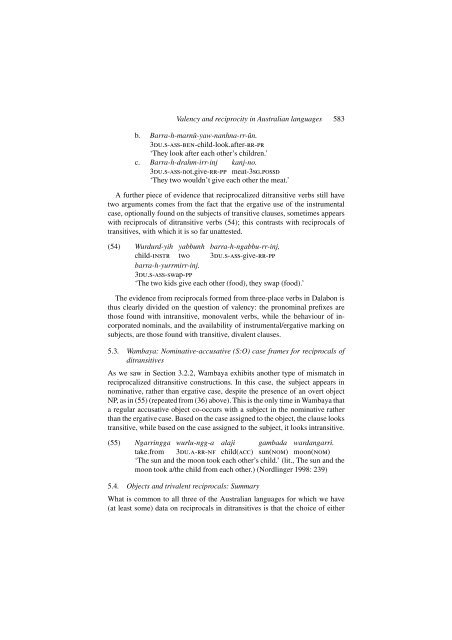Valency mismatches and the coding of reciprocity in ... - Linguistics
Valency mismatches and the coding of reciprocity in ... - Linguistics
Valency mismatches and the coding of reciprocity in ... - Linguistics
Create successful ePaper yourself
Turn your PDF publications into a flip-book with our unique Google optimized e-Paper software.
<strong>Valency</strong> <strong>and</strong> <strong>reciprocity</strong> <strong>in</strong> Australian languages 583<br />
b. Barra-h-marnû-yaw-nanhna-rr-ûn.<br />
3du.s-ass-ben-child-look.after-rr-pr<br />
‘They look after each o<strong>the</strong>r’s children.’<br />
c. Barra-h-drahm-irr-<strong>in</strong>j kanj-no.<br />
3du.s-ass-not.give-rr-pp meat-3sg.possd<br />
‘They two wouldn’t give each o<strong>the</strong>r <strong>the</strong> meat.’<br />
A fur<strong>the</strong>r piece <strong>of</strong> evidence that reciprocalized ditransitive verbs still have<br />
two arguments comes from <strong>the</strong> fact that <strong>the</strong> ergative use <strong>of</strong> <strong>the</strong> <strong>in</strong>strumental<br />
case, optionally found on <strong>the</strong> subjects <strong>of</strong> transitive clauses, sometimes appears<br />
with reciprocals <strong>of</strong> ditransitive verbs (54); this contrasts with reciprocals <strong>of</strong><br />
transitives, with which it is so far unattested.<br />
(54) Wurdurd-yih yabbunh barra-h-ngabbu-rr-<strong>in</strong>j,<br />
child-<strong>in</strong>str two 3du.s-ass-give-rr-pp<br />
barra-h-yurrmirr-<strong>in</strong>j.<br />
3du.s-ass-swap-pp<br />
‘The two kids give each o<strong>the</strong>r (food), <strong>the</strong>y swap (food).’<br />
The evidence from reciprocals formed from three-place verbs <strong>in</strong> Dalabon is<br />
thus clearly divided on <strong>the</strong> question <strong>of</strong> valency: <strong>the</strong> pronom<strong>in</strong>al prefixes are<br />
those found with <strong>in</strong>transitive, monovalent verbs, while <strong>the</strong> behaviour <strong>of</strong> <strong>in</strong>corporated<br />
nom<strong>in</strong>als, <strong>and</strong> <strong>the</strong> availability <strong>of</strong> <strong>in</strong>strumental/ergative mark<strong>in</strong>g on<br />
subjects, are those found with transitive, divalent clauses.<br />
5.3. Wambaya: Nom<strong>in</strong>ative-accusative (S:O) case frames for reciprocals <strong>of</strong><br />
ditransitives<br />
As we saw <strong>in</strong> Section 3.2.2, Wambaya exhibits ano<strong>the</strong>r type <strong>of</strong> mismatch <strong>in</strong><br />
reciprocalized ditransitive constructions. In this case, <strong>the</strong> subject appears <strong>in</strong><br />
nom<strong>in</strong>ative, ra<strong>the</strong>r than ergative case, despite <strong>the</strong> presence <strong>of</strong> an overt object<br />
NP, as <strong>in</strong> (55) (repeated from (36) above). This is <strong>the</strong> only time <strong>in</strong> Wambaya that<br />
a regular accusative object co-occurs with a subject <strong>in</strong> <strong>the</strong> nom<strong>in</strong>ative ra<strong>the</strong>r<br />
than <strong>the</strong> ergative case. Based on <strong>the</strong> case assigned to <strong>the</strong> object, <strong>the</strong> clause looks<br />
transitive, while based on <strong>the</strong> case assigned to <strong>the</strong> subject, it looks <strong>in</strong>transitive.<br />
(55) Ngarr<strong>in</strong>gga wurlu-ngg-a alaji gambada wardangarri.<br />
take.from 3du.a-rr-nf child(acc) sun(nom) moon(nom)<br />
‘The sun <strong>and</strong> <strong>the</strong> moon took each o<strong>the</strong>r’s child.’ (lit., The sun <strong>and</strong> <strong>the</strong><br />
moon took a/<strong>the</strong> child from each o<strong>the</strong>r.) (Nordl<strong>in</strong>ger 1998: 239)<br />
5.4. Objects <strong>and</strong> trivalent reciprocals: Summary<br />
What is common to all three <strong>of</strong> <strong>the</strong> Australian languages for which we have<br />
(at least some) data on reciprocals <strong>in</strong> ditransitives is that <strong>the</strong> choice <strong>of</strong> ei<strong>the</strong>r

















